by Angela Glowacki
The NCCU Host Family to International Students Program is a new initiative started in Fall of 2023. The program matches incoming international students with NCCU faculty, staff and other volunteers. Designed to assist new students’ transition to Taiwan, this opportunity allows for cross cultural learning and mentorship with more flexibility compared to a traditional host family program. Instead of living in their host family’s home, the students join their hosts on activities and excursions where they are exposed to different aspects of Taiwan.
Here are three international students and two host parents sharing their experiences with the Host Family Program so far:
Why did you choose to join the Host Family Program?
Montana Meeker (First Year IMES, USA): When I came to Taiwan, it was my first time going so far away from my own large family at home. I joined the host family program to learn more about Taiwan’s culture, meet new people, and experience what it would be like to be part of a Taiwanese family while away from my own.
Jaden Gloden (First Year IMAS, USA): I chose to join the host family program because I wanted to learn more about life in Taiwan and connect with a local family. I did not have the opportunity to study abroad during my undergraduate, so I was also worried about adjusting to my new life here.
Ela Celebi (First Year IMAS, Turkey): It felt like a good opportunity to learn more about the local people and the traditions. It also brings a feeling of being welcomed in a country where you don’t know anyone.
Esther (Host Mom to Montana): During my time as a visiting student in Canada and USA, I participated in programs akin to the host family. These experiences were invaluable, enriching my understanding of cultural exchange profoundly. When I noticed this program at NCCU, I jumped at the chance to contribute my own part as a faculty member here.
薛建吾 (Host Dad to Ela): I received a lot of help when studying in the United States, and I also want my children to have the opportunity to meet friends from different countries.
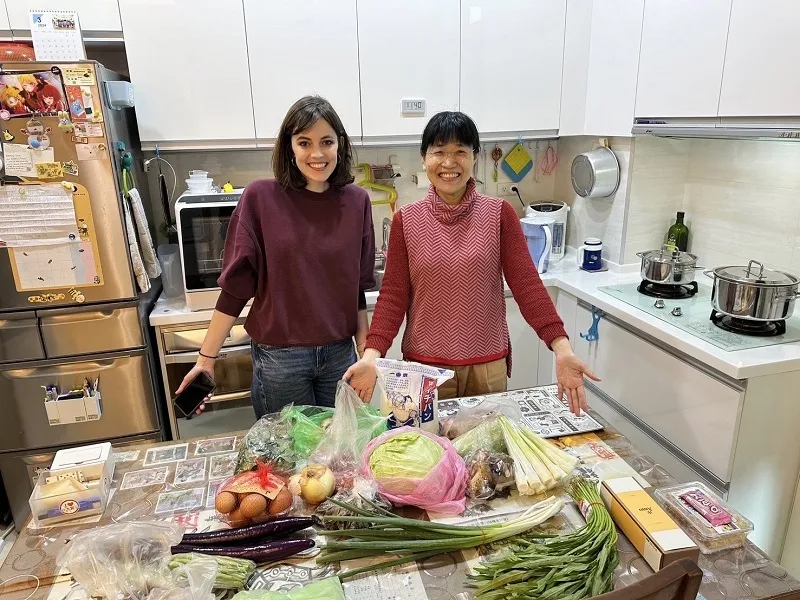
Montana and Esther (credit: Montana Meeker)
What type of activities have you done so far?
Montana: My host family invited me to come along with them to Kaohsiung during the mid-autumn festival. They introduced me to tons of different night market foods, some of which I loved (guava juice, stinky tofu) and some which I was less excited about (snail, intestines). We biked all around the port of Kaohsiung and my host family parents told stories about growing up there. My host family also taught me to cook traditional Taiwanese meals, and I attended my little host family sister’s birthday party.
Jaden: My host mom and I both enjoy hiking. Together we hiked in Keelung and Yangmingshan.
Ela: We are usually going to different types of restaurants to eat. In our first meeting we went to a famous Taiwanese restaurant and then visited a museum. After that our next meetings were also about trying out different types of local foods. I mentioned I wanted to see the lights in Xiamen for the Lantern Festival and they took me to a restaurant there and we walked around.
How do you decide what activities to do with your international student? What have been some memorable activities you have done together?
Esther: So far we only invited our international student to three activities: a birthday party for my 12-year-old daughter, a 3 day trip to my hometown Kaohsiung, and a session on cooking Taiwanese cuisine. During the trip to Kaohsiung, we accompanied our international student to famous tourist spots such as the ferry ride to Chijin Island, cycling around Sizihwan Bay and National Sun Yat-sen University, exploring the Pier-2 Art Center, and strolling through the market. My husband and I were pleasantly surprised by the development of these areas, given that we, as locals, rarely visit them. A memorable encounter involved meeting a man who allowed our student to hold his pet Harris’s Hawk at a market—an experience both unique and thrilling. Another highlight was taking our international student to a nearby traditional market to purchase ingredients, followed by a hands-on cooking lesson where we intricately demonstrated how to prepare Taiwanese dishes. This immersive approach not only showcased the core of Taiwanese cuisine but also proved to be an engaging and effective method of cultural exchange.
薛建吾: Because my family and I all enjoy good food, I often make plans to take them to unique restaurants that foreigners might not easily find, and then we explore the area around the restaurant. We take many photos to commemorate these outings.
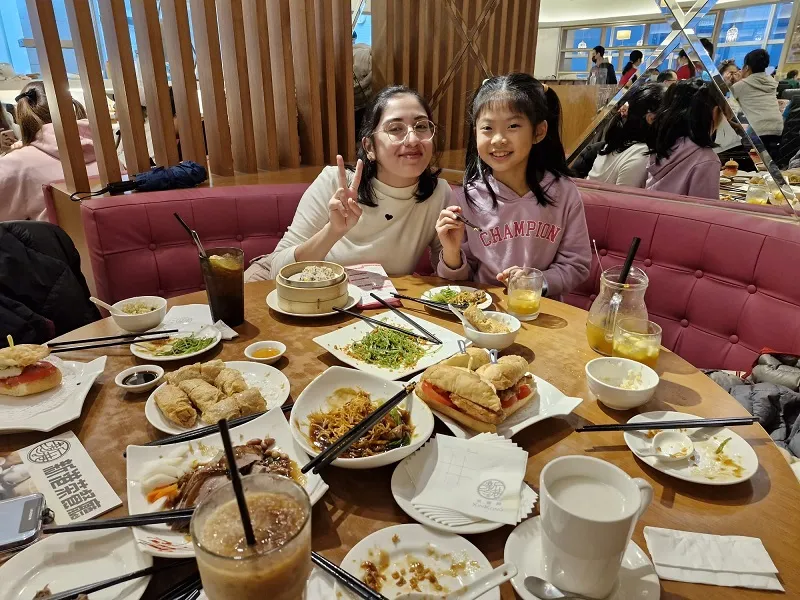
Ela with host sister (credit: Ela Celebi)
How has having a host family helped you adjust to life in Taiwan?
Montana: My host family has been a highlight of my time in Taiwan. I’ve gotten to see how my host family spends time together, what meals they share, what activities they enjoy doing together, and I’ve learned so much about family values in Taiwan. Seeing how my little host family brother and sister (8 and 11) are raised has given me insight into the early lives and childhoods of my other Taiwanese classmates and friends.
Jaden: Although not part of the host family program requirements, my host mom and family have given me lots of opportunities to practice my Chinese. My host mom has also been very welcoming and answered any questions that I have. For example, the first day I met my host mom I mentioned that I was vegetarian-- that day she took the time to walk me around campus to show me all of the vegetarian restaurants I could enjoy!
Ela: They were very kind and welcoming. They offered me a ride to markets or IKEA.
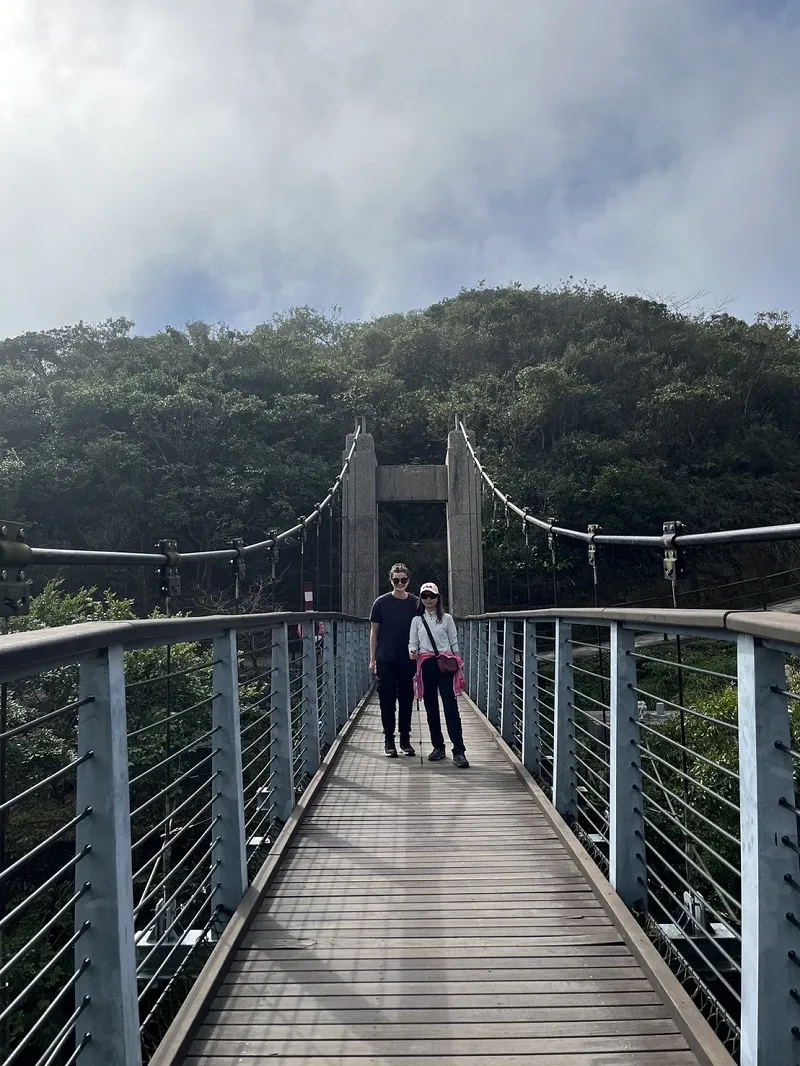
Jaden with host mom (credit: Jaden Gloden)
How has spending time with your international student taught you more about other cultures?
Esther: My international student is from USA, where I had stayed for two years myself, so I thought I was quite familiar with American culture. However, listening to her share stories about her hometown in Texas—a place with a starkly different environment and culture from Taiwan—proved to be both enjoyable and enlightening. Such cross-cultural communication could take place anywhere when we spend time together, such as engaging conversations during the long car ride to Kaohsiung, sharing stories over meals, exploring tourist attractions, wandering through market, or even while cooking together in the kitchen.
薛建吾: I enjoy listening to them talk about their lives, including their educational journey, interactions with family members, and favorite foods, which helps me and my family gain a deeper understanding of both them and their countries.
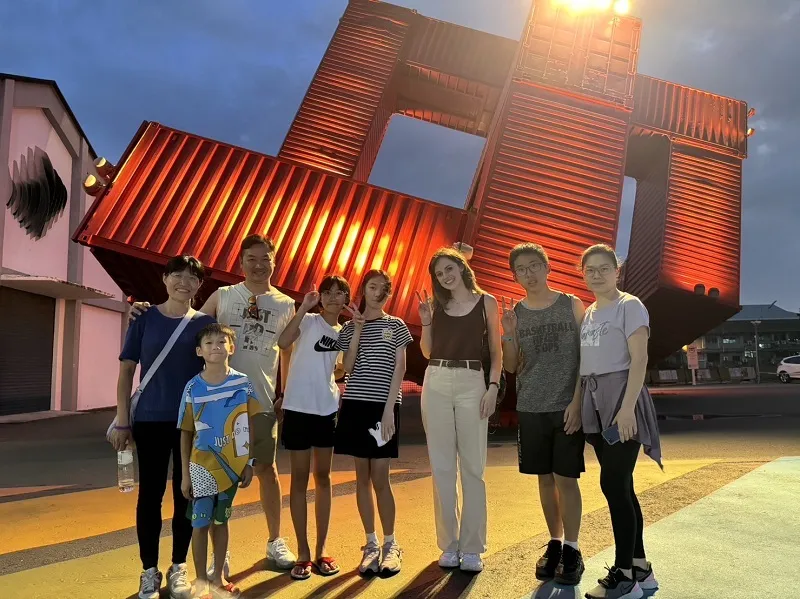
Montana with host family (credit: Montana Meeker)
Would you encourage incoming students to join the program?
Montana: I would say definitely go for it! Having a host family can provide comfort and support while you get adjusted to your new surroundings, and you can learn so much about Taiwanese lifestyle and culture. The host family volunteers are super kind and welcoming, and we are very lucky to have them.
Jaden: I would encourage all incoming international students to join the host family program! It is a great opportunity to learn more about Taiwanese culture, make local connections and friendships, as well as experience the country from another point of view.
Ela: I would highly encourage incoming students to join because all the activities are really nice memories to look back on.
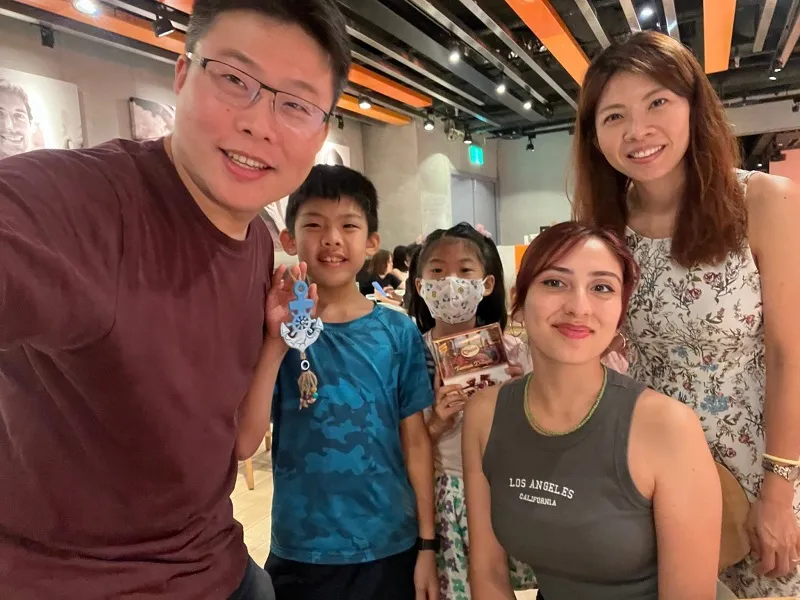
Ela and 薛建吾 with family (Credit: Ela Celebi)
What advice would you give to incoming international students, especially those who may consider joining the Host Family Program?
Esther: Participating in the host family program offers a profound opportunity to immerse oneself in local Taiwanese culture. I wholeheartedly recommend it to incoming international students seeking an authentic cultural experience. It's important to note, however, that host families join this program on a voluntary basis and conduct activities without any financial support. Therefore, mutual respect and consideration become crucial for fostering a positive environment. Additionally, patience and effective communication are key to nurturing a rewarding relationship and ensuring a fulfilling cross-cultural exchange.
薛建吾: I believe that the majority of Taiwanese families are very willing to help newly arrived foreign friends. However, Taiwanese people are usually a bit shy, and their English abilities may be somewhat limited. I sincerely recommend international students to participate in the host family program, as I believe it will create very interesting memories for both Taiwanese families and international students!
Currently, the host family program is open only to new incoming international students. For more information about the Host Family Program, please contact Frank Chang at changhm@nccu.edu.tw.
More on OIC connect no.94:
Taiwan, English and the World: The First Edition of NCCU’s English Diner
Tsou aboriginal group, a closer look
Wang Gong Pastoral Patrolling of the Fields: a Look Into Local Religion in Muzha
Warming Board game night at I-House hosted by IA NCCU
From Campus to Career: Navigating Futures at NCCU's Career Fair
From Campus to Career: Exploring the Working Market in Taiwan for International Students